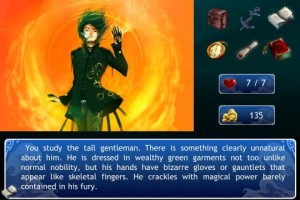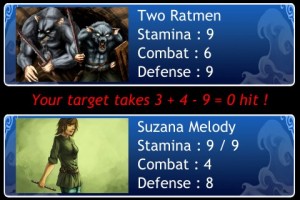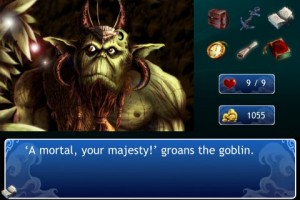If you were into nonlinear gamebooks or Dungeons and Dragons-style pen and paper RPGs during the mid 1990s, you may already have had the pleasure of stepping into the rich medieval world created by Fabled Lands authors Dave Morris and Jamie Thomson. For the rest of us who missed out, Megara Entertainment has been kind enough to adapt the first of this series’ gamebooks on iOS as Fabled Lands: The War Torn Kingdom (Out Now, $6.99). Cast in the roll of a wanderlust-stricken adventurer whose identity is defined by class and gender at the game’s outset, the player can now freely roam the hazardous yet bounty-filled land of Sokara without all the manual hassle of rolling dice and flipping pages.
As the player character has only a general goal in mind – experiencing all the thrills to be found in Sokara without dying in the process – Fabled Lands is almost completely unstructured. Its plot consists of a series of short vignettes strung together in whatever order the player unwittingly walks into them. Once the protagonist washes up on the beaches of Sokara he or she has free reign to explore this highly developed medieval realm through a destination menu system, hemmed in only by geography and whether he or she can survive a particular task with currently available equipment.
 Having stuck very closely to structured JRPGs throughout my gaming life, I found the sheer amount of freedom in Fabled Lands daunting at first. Luckily the series’ greatest asset is its excellent narrative quality: the plethora of weird situations and interesting characters to be encountered on the streets, in the fields, and deep inside the dungeons of Sokara quickly drew me in and kept me invested in the task of searching out new quests to accept from locals. Among this land’s more interesting denizens are a band of cannibals who will happily devour the player character if the protagonist doesn’t play his or her cards right after being abducted; a pack of townspeople who pose as ghosts to frighten their fellows into leaving an annual tribute they then collect on the sly; and a thief who offers to let the player character join her in a heist, only to let him or her serve as scapegoat when the master of the house returns. These episodes play out against the aftermath of a civil war in which a new regime is hunting down partisans loyal to the old Sokaran king, and naturally the player can choose which side of the conflict to join — or stay out of it altogether. Sadly the drawback of Fabled Lands‘ nonlinearity is the fact that most of these characters slip in and out of the story very quickly, leaving the player’s desire to learn more about them undersatiated.
Having stuck very closely to structured JRPGs throughout my gaming life, I found the sheer amount of freedom in Fabled Lands daunting at first. Luckily the series’ greatest asset is its excellent narrative quality: the plethora of weird situations and interesting characters to be encountered on the streets, in the fields, and deep inside the dungeons of Sokara quickly drew me in and kept me invested in the task of searching out new quests to accept from locals. Among this land’s more interesting denizens are a band of cannibals who will happily devour the player character if the protagonist doesn’t play his or her cards right after being abducted; a pack of townspeople who pose as ghosts to frighten their fellows into leaving an annual tribute they then collect on the sly; and a thief who offers to let the player character join her in a heist, only to let him or her serve as scapegoat when the master of the house returns. These episodes play out against the aftermath of a civil war in which a new regime is hunting down partisans loyal to the old Sokaran king, and naturally the player can choose which side of the conflict to join — or stay out of it altogether. Sadly the drawback of Fabled Lands‘ nonlinearity is the fact that most of these characters slip in and out of the story very quickly, leaving the player’s desire to learn more about them undersatiated.
If the storyline description doesn’t make it abundantly clear, Sokara happens to be a very, very dangerous place — which is a good thing because it means there’s more gameplay here than Fabled Lands‘ text-heavy guise at first suggests. The player’s challenge is primarily one of strict resource management and equipment acquisition. When someone or something poses a threat to the protagonist, the difference between life and death usually hinges on whether the player can dip into inventory for an appropriate potion before responding to the challenge, and some quests aren’t accessible at all without a little kleptomaniacal hoarding of ropes for climbing, candles for seeing in the dark, and other intuitively usable sundries that should be snatched in town shops without delay.
 When a challenge arises – whether it be outright fisticuffs, the protagonist’s attempt to bribe his or her way past a guard, or simply trying to scale a mountain – it plays out automatically with an outcome determined somewhat by random chance, but more heavily by the protagonist’s stats in areas appropriate to the challenge. As a result, particular classes are better suited to overcoming different threats, and the player must adopt different survival strategies depending on the class chosen at the game’s outset. For example, a Rogue may have to score his or her first few shards of Sokaran currency by looking for victims to rob in the dead of night, a Warrior can get down to the business of slaying thieves for the money they’ve already taken, and a Troubadour is best suited to collecting that first wad of cash by spinning a yarn clever enough to invoke donations from easily hoodwinked guards.
When a challenge arises – whether it be outright fisticuffs, the protagonist’s attempt to bribe his or her way past a guard, or simply trying to scale a mountain – it plays out automatically with an outcome determined somewhat by random chance, but more heavily by the protagonist’s stats in areas appropriate to the challenge. As a result, particular classes are better suited to overcoming different threats, and the player must adopt different survival strategies depending on the class chosen at the game’s outset. For example, a Rogue may have to score his or her first few shards of Sokaran currency by looking for victims to rob in the dead of night, a Warrior can get down to the business of slaying thieves for the money they’ve already taken, and a Troubadour is best suited to collecting that first wad of cash by spinning a yarn clever enough to invoke donations from easily hoodwinked guards.
With six classes on offer at the game’s outset and each suited to particular tasks, the Fabled Lands experience tends to feel very fresh each go around — at least during the game’s first several hours. Once the player has amassed a healthy cash reserve it’s best to seek out relatively inexpensive stat-boosting potions that temporarily compensate for weaknesses, creating a balance that makes most quests accessible during a first playthrough regardless of the protagonist’s identity. While equipment management is handled by the game automatically, the ever looming threat of running out of funds lends Fabled Lands the tension it needs to effectively straddle the boundary between visual novel and full-on RPG.
 There is one considerable flaw in Fabled Lands‘ iOS execution from a game design perspective: the player isn’t always given fair warning as to the nature of a threat or the results of a particular choice. More often than not the process is intuitive; if the narrative describes an encounter with a sea monster or rabid rat-people, that’s the player’s cue to make sure the protagonist is fully healed so he or she can survive a battle. However, the game has its fair share of head-scratchers as well: who would have guessed that a choice to “Rack your brain for a solution” when confronted with a tomb-full of armed squid would lead to instant death? (Psst! The correct choice there appears to be “Cast a spell” regardless of whether the protagonist happens to be magic-adept). There’s also the ubiquitous danger that the protagonist might suddenly be bonked over the head in a randomized event and bereft of all the player’s hard earned money instantaneously. Hey, nobody said Sokara is a particularly friendly place after all.
There is one considerable flaw in Fabled Lands‘ iOS execution from a game design perspective: the player isn’t always given fair warning as to the nature of a threat or the results of a particular choice. More often than not the process is intuitive; if the narrative describes an encounter with a sea monster or rabid rat-people, that’s the player’s cue to make sure the protagonist is fully healed so he or she can survive a battle. However, the game has its fair share of head-scratchers as well: who would have guessed that a choice to “Rack your brain for a solution” when confronted with a tomb-full of armed squid would lead to instant death? (Psst! The correct choice there appears to be “Cast a spell” regardless of whether the protagonist happens to be magic-adept). There’s also the ubiquitous danger that the protagonist might suddenly be bonked over the head in a randomized event and bereft of all the player’s hard earned money instantaneously. Hey, nobody said Sokara is a particularly friendly place after all.
That being the case, the average player should expect plenty of visits with the Grim Reaper and subsequent experimentation after re-loading. Since the game lacks an auto-save, sticklers for convenience are liable to be especially irked, and it doesn’t help that a bit of one’s funds must be sacrificed to save the game at inns until the player lays claim to a subterranean hideout where this can be accomplished for free.


